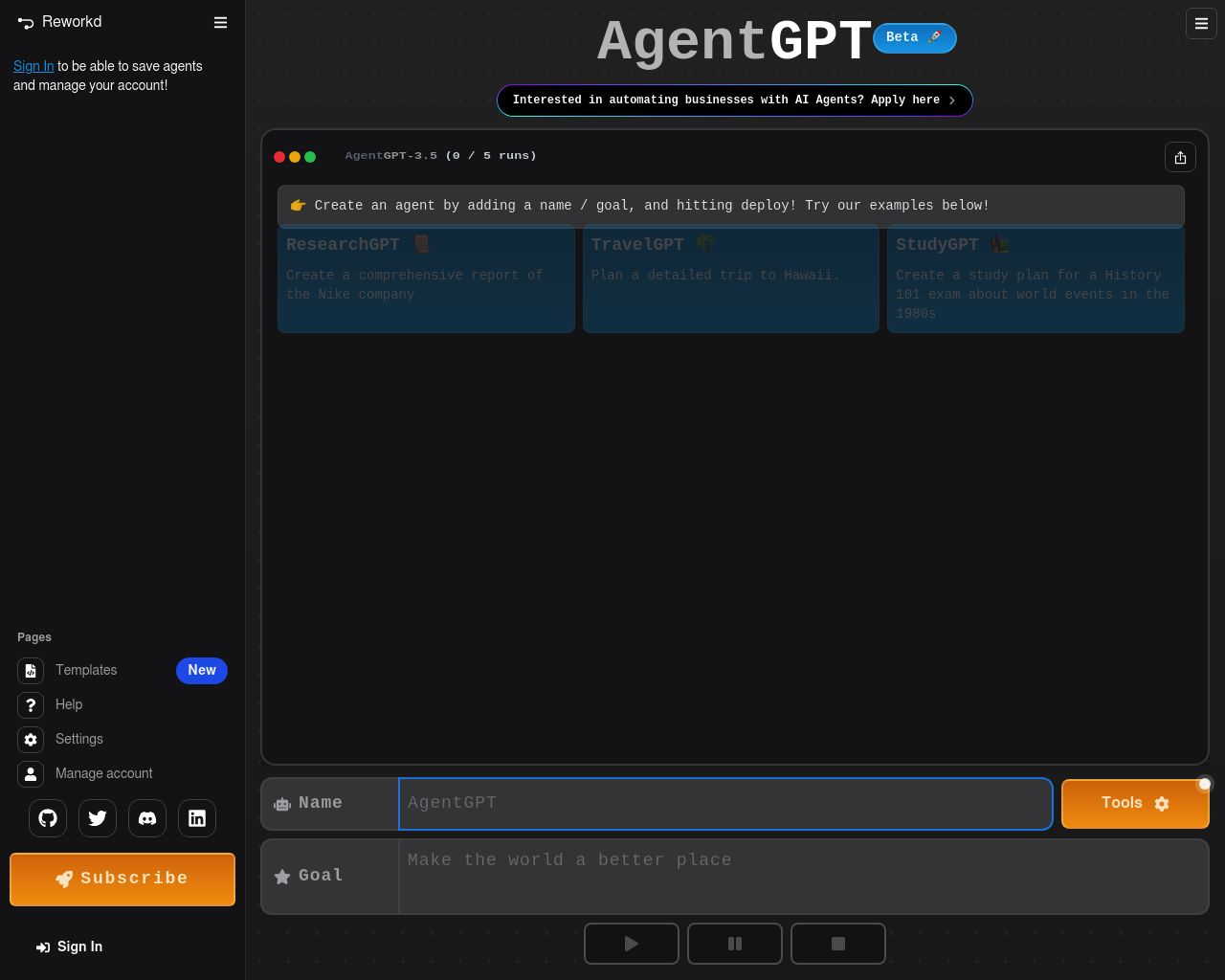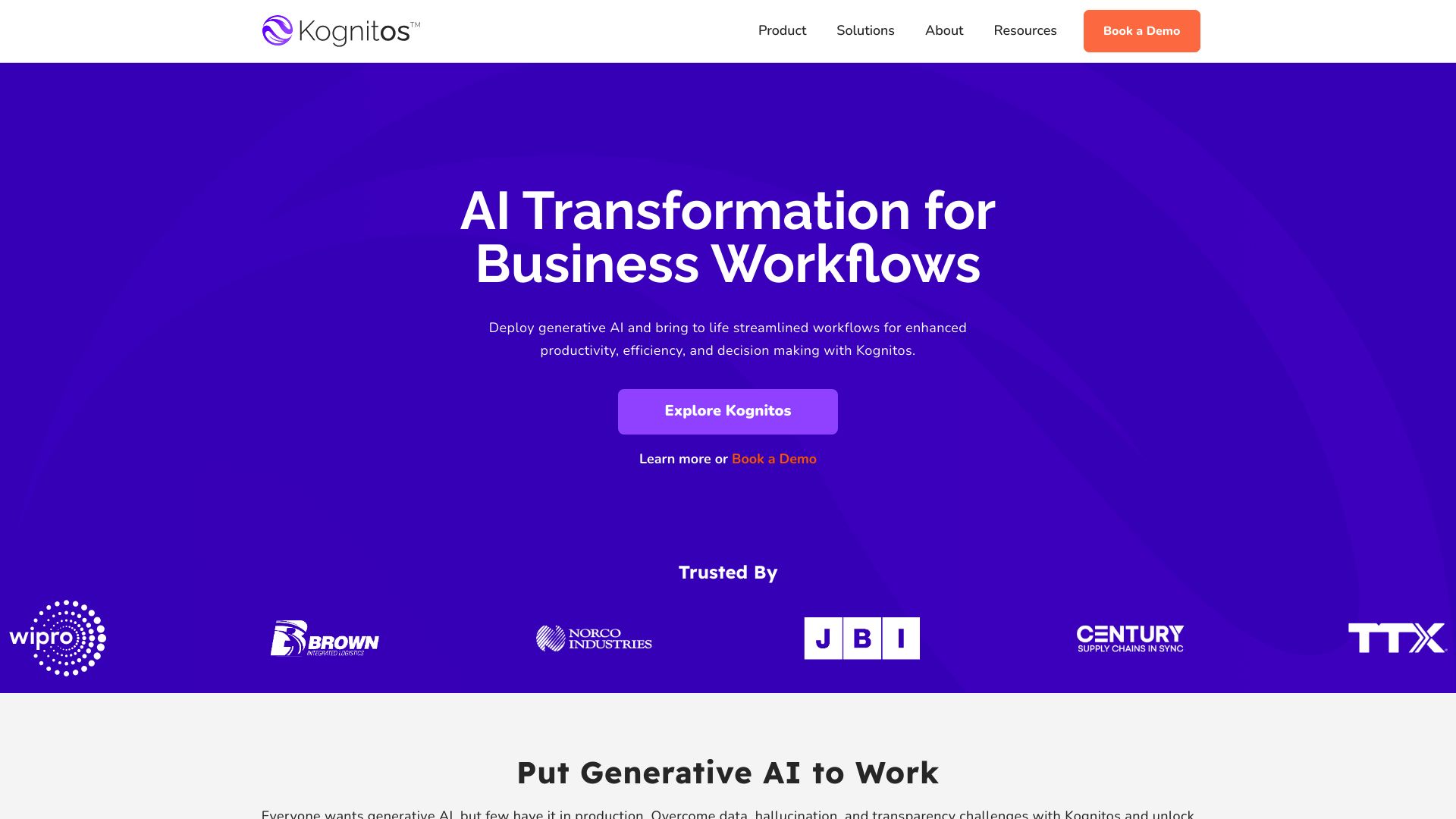AgentGPT vs. Kognitos: AI Automation Titans Compared
AI-powered automation platforms are transforming how businesses operate, with AgentGPT vs. Kognitos leading the charge in distinct ways. AgentGPT empowers developers to create autonomous AI agents through an open-source web platform, while Kognitos revolutionizes process automation with its natural language approach.
This comparison delves into the unique features, strengths, and limitations of both platforms, providing insights for technical teams, business leaders, and AI enthusiasts alike. We’ll explore how these tools stack up against SmythOS, our comprehensive AI development platform that combines powerful features with user-friendly design. Whether you’re a seasoned developer or a business professional seeking to harness AI’s potential, this analysis will guide you through the landscape of modern AI automation tools.
AgentGPT Overview
AgentGPT empowers developers to create and deploy autonomous AI agents through an open-source web platform. Unlike traditional chatbots, these agents execute broad, goal-oriented tasks independently. The platform’s user-friendly interface allows for quick deployment of AI solutions without extensive coding knowledge.


AgentGPT stands out with its vector database integration for enhanced memory management. This feature enables AI agents to retain execution history and access long-term memory, significantly improving their functionality over extended periods. The platform supports various AI models, including GPT-3.5 and GPT-4, providing flexibility in agent capabilities.
AgentGPT stands out with its vector database integration for enhanced memory management. This feature enables AI agents to retain execution history and access long-term memory…
Key features of AgentGPT include user authentication, saved agent runs, dynamic translations, and web browsing capabilities. These tools make the platform versatile for applications ranging from simple tasks to complex operations. The system’s scalability through cloud offerings and integration with tools like LangChain further enhance its appeal to businesses seeking efficient AI solutions.
However, AgentGPT has limitations. The platform lacks a visual builder and no-code editor, which may present challenges for users without technical backgrounds. Additionally, there’s no explicit mention of features for explainability, transparency, or debug mode, which could be crucial for some applications.
AgentGPT’s focus on open-source development fosters a collaborative community, driving continuous improvement and innovation. While it offers robust tools for AI agent creation, users should consider their specific needs and technical expertise when evaluating its suitability for their projects.
Kognitos Overview
Kognitos delivers an AI-driven automation platform that transforms business processes through natural language interactions. The system empowers users to build, manage, and optimize automations using plain English, eliminating the need for complex coding or traditional bot management.


Kognitos integrates generative AI with traditional logic, creating a powerful and adaptable solution. This combination allows the platform to learn and improve over time, handling exceptions and variations in processes through natural dialogue with users. The system’s ability to understand context and adapt to changes sets it apart from rigid, rule-based automation tools.
Kognitos integrates generative AI with traditional logic… allowing the platform to learn and improve over time, handling exceptions and variations in processes through natural dialogue with users.
Unlike traditional RPA solutions, Kognitos runs entirely from a browser, leveraging stable API-based automations. This approach eliminates the need for managing separate automation bots, simplifying deployment and maintenance. The platform seamlessly integrates with third-party applications and supports multiple operating systems, breaking free from Windows-only limitations.
Kognitos caters to a wide range of industries and use cases, from document processing and Excel manipulation to email handling and Salesforce integration. Its user-friendly approach democratizes AI-powered automation, making it accessible to both technical and non-technical users alike. However, the platform’s reliance on natural language processing may present challenges in highly specialized or technical domains where precise, code-level control is required.
Feature Comparison
AgentGPT and Kognitos offer distinct approaches to AI agent development, with notable differences in their core components and security features. AgentGPT provides a platform for creating autonomous AI agents with robust memory management through vector database integration. This allows agents to retain execution history and access long-term memory, enhancing functionality over extended periods. AgentGPT supports various AI models like GPT-3.5 and GPT-4, offering flexibility in agent capabilities.
In contrast, Kognitos focuses on natural language-driven automation, enabling users to build and manage automations using plain English. This approach eliminates the need for complex coding, making it more accessible to non-technical users. Kognitos integrates generative AI with traditional logic, creating an adaptable solution that learns and improves over time through natural dialogue.
SmythOS stands out by offering a comprehensive suite of features that address the limitations of both platforms. Unlike AgentGPT and Kognitos, SmythOS provides a visual builder and no-code editor, making agent creation accessible to users of all technical backgrounds. SmythOS also excels in security features, offering constrained alignment, data encryption, and OAuth integration, which are not explicitly mentioned for AgentGPT or Kognitos. Additionally, SmythOS supports multi-agent collaboration and human-AI interaction, features that enhance its versatility compared to the other platforms.
Feature Comparison Table
| AgentGPT | Kognitos | SmythOS | |
|---|---|---|---|
| CORE FEATURES | |||
| Visual Builder | ❌ | ❌ | ✅ |
| No-Code Options | ❌ | ✅ | ✅ |
| Explainability & Transparency | ❌ | ✅ | ✅ |
| Human-AI Interaction | ❌ | ✅ | ✅ |
| SECURITY | |||
| Constrained Alignment | ❌ | ❌ | ✅ |
| IP Control | ❌ | ❌ | ✅ |
| COMPONENTS | |||
| Foundation AIs | ❌ | ✅ | ✅ |
| Zapier APIs | ✅ | ❌ | ✅ |
| Data Lakes | ❌ | ❌ | ✅ |
| DEPLOYMENT OPTIONS (EMBODIMENTS) | |||
| Deploy as Webhook | ✅ | ❌ | ✅ |
| Staging Domains | ❌ | ✅ | ✅ |
| Production Domains | ❌ | ✅ | ✅ |
| Deploy as Site Chat | ✅ | ❌ | ✅ |
| Deploy as Scheduled Agent | ❌ | ✅ | ✅ |
| Deploy as GPT | ✅ | ❌ | ✅ |
| DATA LAKE SUPPORT | |||
| Hosted Vector Database | ✅ | ❌ | ✅ |
| Sitemap Crawler | ❌ | ❌ | ✅ |
| YouTube Transcript Crawler | ❌ | ❌ | ✅ |
| URL Crawler | ✅ | ❌ | ✅ |
Best Alternative to AgentGPT and Kognitos
SmythOS emerges as the superior alternative to AgentGPT and Kognitos, offering a comprehensive platform for AI agent creation and deployment. We provide a powerful visual builder and no-code editor, making agent development accessible to users of all technical backgrounds. Our platform excels in delivering a rich feature set that addresses the limitations of both AgentGPT and Kognitos.
Unlike AgentGPT’s focus on autonomous agents with memory management, and Kognitos’ emphasis on natural language automation, SmythOS offers a versatile solution that combines the best of both worlds. We enable users to create sophisticated AI agents with advanced memory and context capabilities, while also supporting natural language interactions and automation workflows.
SmythOS offers a versatile solution that combines the best of both worlds… with advanced memory and context capabilities, while also supporting natural language interactions and automation workflows.
SmythOS stands out with its robust security features, including constrained alignment, data encryption, and OAuth integration, which are not explicitly mentioned for AgentGPT or Kognitos. This ensures that our platform meets the highest standards of data protection and compliance, making it ideal for enterprise-level deployments.
Our platform’s extensive integration ecosystem sets it apart from the competition. With support for various AI models, APIs, and tools, SmythOS offers unparalleled flexibility in connecting to existing workflows and business processes. This allows users to leverage their preferred AI models and integrate with popular services seamlessly.
SmythOS caters to unlimited use cases, from simple chatbots to complex multi-agent systems capable of handling intricate tasks. Our platform’s scalability and versatile deployment options, including API endpoints, webhooks, and scheduled agents, ensure that SmythOS can adapt to any business need or industry requirement. By choosing SmythOS, users gain access to a future-proof solution that combines ease of use with powerful AI capabilities, positioning their organizations at the forefront of AI innovation.
Conclusion
AgentGPT and Kognitos offer unique approaches to AI-driven automation, each with distinct strengths. AgentGPT excels in creating autonomous AI agents with robust memory management, while Kognitos focuses on natural language-driven automation accessible to non-technical users. Both platforms have carved out niches in the AI automation landscape, addressing specific user needs.
However, SmythOS emerges as the superior choice, combining the best features of both platforms while addressing their limitations. Our comprehensive suite includes a visual builder and no-code editor, making agent creation accessible to users of all technical backgrounds. We’ve prioritized security with features like constrained alignment, data encryption, and OAuth integration, ensuring your data and processes remain protected.
SmythOS stands out with its support for multi-agent collaboration and human-AI interaction, features that significantly enhance its versatility. Our platform’s ability to deploy agents as APIs, webhooks, scheduled tasks, or chatbots provides unparalleled flexibility. The integration of a hosted vector database and support for various file formats further solidifies SmythOS as a robust, all-in-one solution for AI-driven automation.
Experience the future of AI automation with SmythOS. Explore our diverse range of AI-powered agent templates to jumpstart your journey, or create a free account to build and deploy your own AI agents. With our 30-day money-back guarantee, you can discover the power of SmythOS risk-free. Transform your workflow and unleash the full potential of AI for your business today.
Last updated:
Disclaimer: The information presented in this article is for general informational purposes only and is provided as is. While we strive to keep the content up-to-date and accurate, we make no representations or warranties of any kind, express or implied, about the completeness, accuracy, reliability, suitability, or availability of the information contained in this article.
Any reliance you place on such information is strictly at your own risk. We reserve the right to make additions, deletions, or modifications to the contents of this article at any time without prior notice.
In no event will we be liable for any loss or damage including without limitation, indirect or consequential loss or damage, or any loss or damage whatsoever arising from loss of data, profits, or any other loss not specified herein arising out of, or in connection with, the use of this article.
Despite our best efforts, this article may contain oversights, errors, or omissions. If you notice any inaccuracies or have concerns about the content, please report them through our content feedback form. Your input helps us maintain the quality and reliability of our information.
